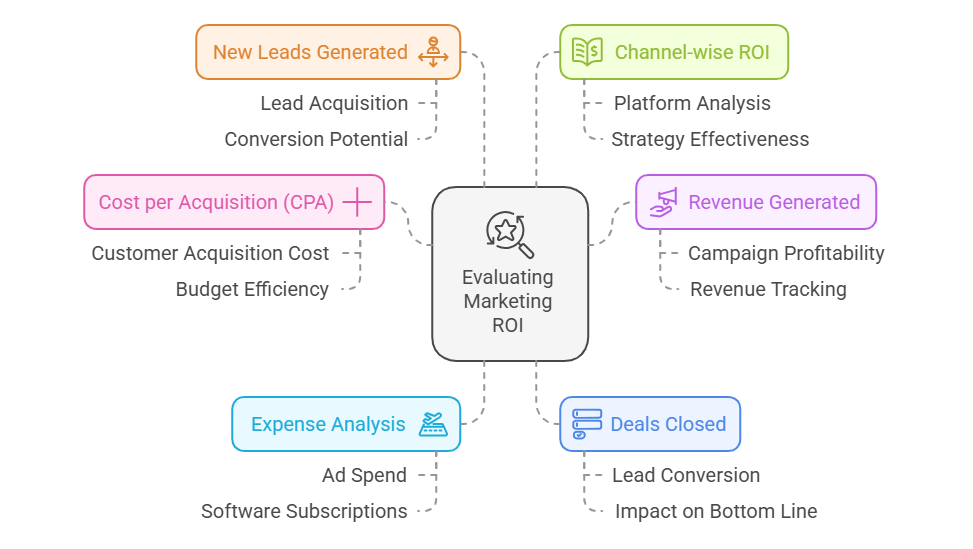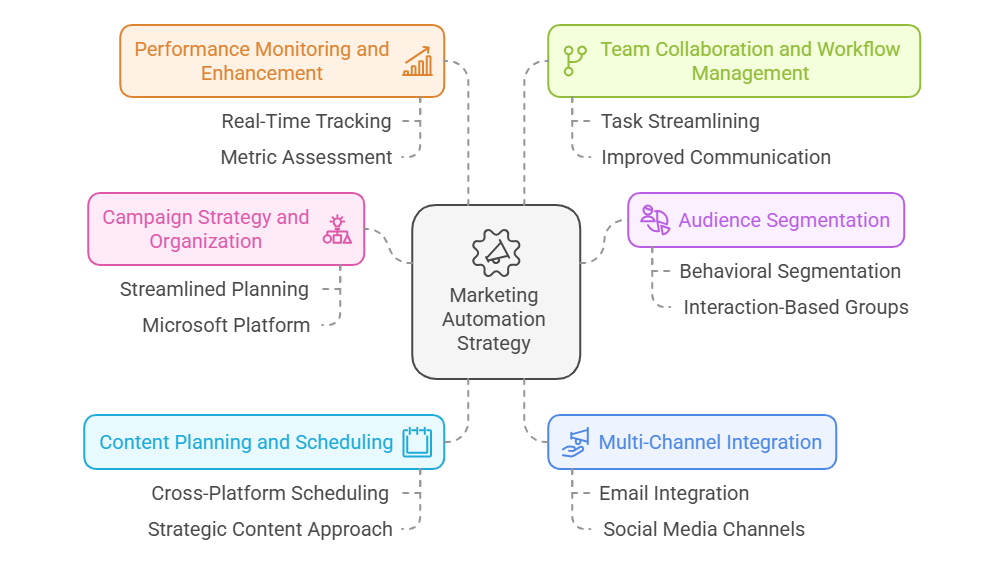Marketing automation offers a significant advantage for the companies aiming to simplify complex customer journeys and improve their marketing efforts. Given the wide array of marketing tools available, choosing the right ones can be challenging. Marketing automation platform streamlines the process by consolidating everything into a single platform, making campaign management more efficient.
Marketing automation software helps businesses handle their marketing strategies, offering an effective tool to simplify workflows, enhance efficiency, and increase return on investment (ROI). In the current competitive market, maximizing Marketing automation ROI is crucial for companies across all sectors and sizes.
What is Marketing Automation?
Marketing automation involves utilizing software and technology to simplify and automate repetitive marketing tasks and workflows. It enables companies to handle, nurture leads, customize marketing communications, monitor important metrics, and refine campaigns for optimal effectiveness. The best marketing automation tool can assess which aspects of a launched advertising campaign are performing well and adjust them for better results. As per Statista, in 2024 the global marketing automation industry’s revenue will reach an estimated 8.23 billion USD. That annual value was projected to more than double by 2032, surpassing 21 billion USD.
Instead of constantly responding to customer actions, you can develop a strategy that aligns with their journey and let the automation platform execute it upfront. In addition to automated emails, your strategy may also include retargeting ads, A/B testing, and other tools to streamline your marketing efforts, ensuring you connect with customers at every stage of their interaction with your business.
How the Best Marketing Automation Platform Boost Your ROI?
Marketing automation is essential in driving ROI by automating tasks, streamlining processes, personalizing campaigns, and providing valuable data for measurement and optimization. Below, we will explore these aspects in more detail and discuss how businesses can leverage the best marketing automation tool to maximize their marketing automation ROI.
.
1. Streamlined Workflows
-
- Simplifies routine tasks: Automates repetitive marketing activities like email campaigns, social media scheduling, and lead scoring.
- Saves time and effort: Automating a large number of repetitive tasks helps businesses align more effectively with market trends.
2. Personalized Campaigns
-
- Customizes messaging for specific segments: Provides advanced segmentation features, enabling businesses to divide their audience based on demographics, interests, or behavior.
- Boosts relevance and engagement: Businesses can send personalized content, product suggestions, and promotions tailored to individual customer preferences and past interactions.
3. Enhanced Decision-Making Through Data Insights
-
- Actionable insights from analytics: Automation tools provide detailed reports on campaign performance, customer behavior, and conversion rates.
- Improves strategy refinement and resource distribution: By identifying the most successful campaigns, channels, and customer segments, marketers can focus their budget and resources on initiatives that yield the highest ROI.
4. Efficient Lead Mangement
-
- Lead scoring highlights high priority leads: Automation platforms allow for lead scoring, assigning values to leads based on their characteristics and interactions.
- Nurturing workflows enhance conversion rates: Automated lead nurturing workflows deliver targeted content and follow-up to prospects at different stages of the buyer’s journey.
5. Integration and Collaboration
-
- Effortless integration with multiple tools: Automation platforms smoothly connect with various tools like customer relationship management (CRM) systems, email marketing platforms, and social media tools.
- Enhances cross-team collaboration: By sharing data across sales, marketing, and customer support, teams can coordinate their efforts, work in harmony, and provide a seamless customer experience.
What Key Metrics Should I Consider When Evaluating My ROI?
As a marketer, understanding the impact of your campaigns is essential for achieving success and optimizing strategies. By leveraging data-driven insights, you can refine your marketing efforts for better results.
Consider a real-world example: You manage a fashion ecommerce store, overseeing email marketing, social media marketing, conversion rate optimization, lead nurturing, and campaign attribution. Here are the key metrics to measure the success of these activities:
- Cost per Acquisition (CPA): Calculate the cost of acquiring each new customer to ensure your marketing budget is being used efficiently for maximum ROI.
- Revenue Generated: Track the revenue driven by your marketing efforts to evaluate the overall profitability of your campaigns.
- Expense Analysis: Analyse your marketing expenses, including ad spend, software subscriptions, and campaign creation costs, to maintain a balanced budget and optimize resource allocation.
- Deals Closed: Monitor the number of deals closed through your marketing initiatives to assess how well your strategies are converting leads into customers and impacting your bottom line.
- New Leads Generated: Measure the number of new leads acquired to evaluate the effectiveness of your lead generation efforts and their potential to convert into paying customers.
- Channel-wise ROI: Analyze the ROI of each marketing channel to identify which platforms and strategies are most effective, enabling you to focus on the most profitable areas for your business.
How to Plan Your Marketing Automation Strategy
To create a successful marketing automation strategy, it’s important to lay a solid foundation that aligns with your business goals and audience needs. By understanding your objectives, choosing the right tools, and crafting targeted campaigns, you can drive higher engagement and improve ROI. Below are the key elements to consider when planning your marketing automation strategy:
1. Streamlined Campaign Strategy and Organization: Maximize campaign effectiveness through efficient planning and organization with Microsoft’s marketing automation platform
2. Targeted Audience Segmentation: Segment your audience into distinct groups based on characteristics, behaviors, and interactions to craft personalized campaigns.
3. Content Planning and Scheduling: Strategically plan your content approach and schedule tailored content across multiple platforms.
4. Seamless Multi-Channel Integration: Integrate campaigns effortlessly across channels like email, social media, WhatsApp, and SMS to ensure effective audience reach.
5. Campaign Performance Monitoring and Enhancement: Track campaign performance in real time, assess key metrics, and refine strategies to improve ROI.
6. Effective Team Collaboration and Workflow Management: Boost teamwork, streamline tasks, and improve communication among team members with Microsoft’s marketing automation platform.
Conclusion
Marketing automation platform plays a crucial role in simplifying workflows, personalizing customer interactions, and driving significant ROI. It enhances campaign management, improves team collaboration, and delivers data insights that can help businesses refine their strategies for better results. By focusing on metrics such as cost per acquisition, revenue, and lead generation, companies can measure the success of their efforts and optimize their marketing spend.
Microsoft’s Marketing Automation Platform an AI-driven automation platform, helps businesses connect with prospects and customers at scale. Its robust features allow businesses to build lasting relationships while ensuring that marketing initiatives are both effective and efficient. To learn how the best marketing automation tool, like Microsoft’s Marketing Automation Platform, can benefit your business, reach out for a consultation.
FAQs
What tasks can marketing automation platform handle?
Marketing automation can manage tasks like email campaigns, social media scheduling, lead scoring, and customer segmentation.
Can Microsoft’s Marketing Automation platform integrate with other Microsoft tools?
Yes, it seamlessly integrates with other Microsoft tools like Dynamics 365 CRM, Power BI, and Microsoft Teams to create a unified platform for marketing, sales, and customer service teams.
How can marketing automation improve customer engagement?
By sending personalized and timely messages, marketing automation keeps customers engaged and nurtures relationships, leading to higher conversion rates.
What are the key features of Microsoft’s Marketing automation platform?
Key features include customer journey mapping, lead scoring, segmentation, email marketing, event management, campaign automation, and detailed reporting.
How can automation improve efficiency in marketing campaigns?
Automation reduces manual tasks, speeds up processes, and ensures timely execution of campaigns, allowing businesses to focus on higher-level strategy.
















